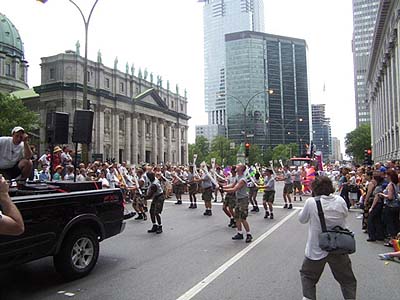Pride parade: Difference between revisions
No edit summary |
|||
| Line 36: | Line 36: | ||
[[fr:Gaypride]] |
[[fr:Gaypride]] |
||
[[he:מצעד הגאווה]] |
[[he:מצעד הגאווה]] |
||
[[yi:שטאלץ פאראד]] |
|||
[[it:Gay pride]] |
[[it:Gay pride]] |
||
[[ja:ゲイ・パレード]] |
[[ja:ゲイ・パレード]] |
||
Revision as of 22:01, 31 January 2006

A pride parade is part of a festival or ceremony held by the LGBT community of a city to commemorate the struggle for gay liberation, gay rights, and gay pride.
The gay community of a city will typically present an annual parade, sometimes in the context of a longer celebration including performances, dances, street parties, and the like. Most gay pride parades take place in the summer, particularly in June, to commemorate the Stonewall riots.
Pride parades evolved from protest marches held by gay people to fight for their rights. Many parades still have this political or activist character (Pride March), especially in less gay-positive settings. However, in more gay-positive cities, the parades take on a festive or even Mardi Gras-like character. Large parades often involve floats, dancers, drag queens, and amplified music; but, even such celebratory parades usually include political and educational contingents, such as local politicians and marching groups from gay and queer institutions of various kinds. Other typical parade participants include local gay-friendly churches such as Metropolitan Community Churches and Unitarian Universalist Churches, PFLAG (Parents and Friends of Lesbians and Gays), and the gay employee associations from large businesses.
Even the most festive parades often offer some aspect dedicated to remembering victims of AIDS. Some particularly important pride parades are funded by governments and corporate sponsors, and promoted as major tourist attractions for the cities that host them. In some countries, some pride parades are now also called Pride Festivals. Some of these festivals provide a carnival-like atmosphere in a nearby park or city-provided closed-off street, with information booths, music concerts, barbecues, beer stands, contests, sports, and games.
Historically these events were named Gay but have evolved over the years. First to Lesbian and Gay then to today's Lesbian, Gay, Bisexual and Transgender (LGBT). Some of these changes met with initial resistance in their own communities.
A portion of homosexuals and non-homosexuals regard pride parades, especially those of a more festive character, as vulgar flaunting of sexual orientation, charging them with an undue emphasis on sex and bizarre behaviour which they see as detrimental to the cause of gay rights. Others criticize this position, seeing it as pandering to homophobia, and arguing that heterosexuality takes centre stage the other 364 days of the year and that pride parades promote visibility and discussion of gay and lesbian issues. Most argue that such parades are carnivals and that they should be taken as such rather than as representative of everyday life for someone who happens to be gay.
Cities particularly noted for their pride parades include Atlanta, Amsterdam, Berlin (Christopher Street Day), Cologne, Houston, London, Birmingham, Long Beach, Madrid, Manchester, Montreal (Divers/Cité), New York, Salt Lake City (Utah Pride Festival), Buenos Aires, San Francisco (San Francisco Pride), São Paulo (Parada do Orgulho GLBT de São Paulo), Sydney (see Sydney Gay and Lesbian Mardi Gras), Tel Aviv Tokyo, Toronto (Gay Pride Week),Vancouver, and West Hollywood.
In the Netherlands the day is called Roze Zaterdag (Pink Saturday), while in Germany it's called Christopher Street Day.
On July 22, 2005 the first Latvian gay pride march took place in Riga, surrounded by protesters. It had previously been banned by the city council, and the Prime Minister of Latvia, Aigars Kalvītis opposed the event, stating Riga should "not promote things like that", however a court decision allowed the march to go ahead [1]. On July 1 at the same year, a parade took place in Jerusalem on similar conditions (a municipal ban, canceled by the court), when a young ultra-Orthodox Jewish man tried to murder 3 people with a kitchen knife.
